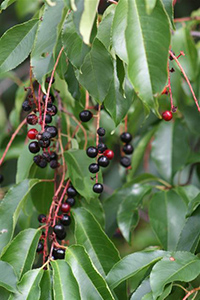The bark of the wild black cherry is a traditional remedy used by North American natives. Current pharmacological research has proven the medicinal properties of this beautiful tree, and its use has spread all over the United States and some regions of Europe.
A similar species in appearance and properties exist in Central and Southern America. Some authors gave both species the same scientific name, Prunus serotina Ehrh., or a synonym: Prunus capuli Cav. This American cherry tree is popularly known as the Andean and Virginian bird cherry.

Wild Black Cherry Scientific Facts
- Scientific synonyms: Prunus virginia L., Prunus melanocarpa Rydb.
- Similar species: Prunus capuli Cav.
- Other names: American choke cherry, Virginian bird cherry.
- French: Cerisier de Virginie.
- Spanish: Cerezo de Virginia.
- Environment: It grows in forests in North America.
- Description: A Rosaceae family tree can grow up to 30 m high and has a dark, rough bark. Its fruits are similar to common cherries but more minor, darker, and sourer-tasting.
- Parts of the plant used medicinally: The bark.
Healing Properties and Warning

The wild black cherry tree bark contains a coumaric glycoside (prunasine), coumaric acid, tannin, scopoletin, and essential oil. Its main medicinal action is expectorant and antitussive. It eases the elimination of mucus from the respiratory pathways and relieves coughs. It is advantageous for colds and bronchitis.
Some American native tribes use the wild black cherry to alleviate labor pains due to its soothing properties.

WARNING! The leaves of the wild black cherry are poisonous because they contain hydrocyanic acid. However, the bark does not include this poison, so its use is harmless.
Wild Cherry Bark
Wild cherry bark (Prunus serotina) is primarily used in treating chronic coughs, specifically those with mucus. It is a mild sedative, expectorant, and tonic to the digestive and respiratory tracts. It is a fantastic remedy when stomach disorders cause heart palpitations. The bark can loosen the chest and throat mucus and soothe lung and stomach nerve irritations. It can also stimulate the gastric glands, which help improve digestion. The bark is excellent for the nervous stomach, whooping cough, tuberculosis, dyspepsia, diarrhea, bronchitis, asthma, colds, and coughs.
Infusion: Steep five to fifteen minutes and take six ounces three to four times daily between meals. Decoction: Simmer for five to fifteen minutes and take two ounces three times daily. Tincture: Take thirty to sixty drops three times daily. Fluid Extract: Take ½ to two teaspoons three times daily. Powder: Take five #0 capsules three times daily. Syrup: Take ½ to two teaspoons three times daily.
How to use Wild Black Cherry
- Infusion with a teaspoonful of ground bark in a cup of hot water.
Frequently Asked Question
What part of the wild black cherry is used medicinally?
Traditionally, the bark and fruit of the wild black cherry have been used medicinally. However, most current applications utilize extracts from the inner bark.
How does wild black cherry potentially help with coughs?
Wild cherry bark has chemicals that act as expectorants, aiding in the loosening of mucus in the airways to facilitate its expulsion by coughing. Additionally, it may have a mild sedative effect that can help suppress coughing at night.
Can wild black cherry benefit digestion?
Are there any reported anti-inflammatory properties of wild black cherry?
Some research suggests that wild cherry bark may contain chemicals that help reduce inflammation.
Is wild black cherry safe to consume?
Most healthy adults consider The plant safe in small to moderate amounts. However, it is imperative to consult a healthcare professional before using this product, especially if you are pregnant, nursing, or currently taking medication.
Can wild black cherry interact with medications?
It may potentially cause drug interactions with specific medications, such as sedatives and blood thinners. Talk with your doctor before using it if you take any medicines regularly.
Are there any side effects associated with wild black cherry?
Wild cherry bark may cause nausea, vomiting, and dizziness in high doses. Follow the recommended dosages and discontinue use if you experience any adverse effects.
How is wild black cherry typically consumed for medicinal purposes?
It is most commonly found in cough syrups and lozenges. It may also be available in teas or tinctures. However, due to the concentrated nature of the extract, these forms require dilution before consumption.
Can you eat the fruit of the wild black cherry?
Yes, the fruit of the wild black cherry is edible. However, it has a tart flavor and is not commonly eaten fresh. It’s often used in jams, jellies, or syrups.
Are there other potential health benefits of wild black cherry that are being studied?
Some preliminary research suggests wild black cherry may have antioxidant properties, but more investigation is needed to confirm these findings.
DISCLAIMER: All content on this website is presented solely for educational and informational objectives. Do not rely on the information provided as a replacement for advice, diagnosis, or treatment from a qualified medical expert. If you are pregnant, nursing, or have any preexisting medical concerns, talk to your doctor before using any herbal or natural medicines.
REFERENCES
- George D. Pamplona-Roger, M.D. “Encyclopedia of Medicinal Plants.” George D. Pamplona-Roger, M.D. Encyclopedia of Medicinal Plants. Ed. Francesc X. Gelabert. Vols. 1 San Fernando de Henares: Editorial Safeliz, 2000. 330. Print.
- Vance Ferrell Harold M. Cherne, M.D. The Natural Remedies Encyclopedia [Book]. – Altamont, TN: Harvestime Books, 2010. – Vol. Seventh Edition: 7: pp. 185, 186.
- WebMD: https://www.webmd.com/vitamins/ai/ingredientmono-888/wild-cherry
- NCBI: https://www.ncbi.nlm.nih.gov/pmc/articles/PMC6270007/

